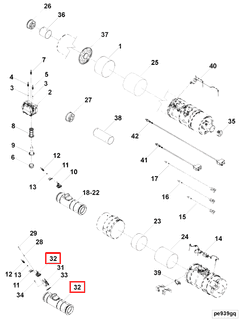5296003
Decomposition Reactor
Cummins®
IN STOCK

More than 10 are currently available
Ships within 1 business day
This truck part is made by Cummins®. We guarantee that all of our parts are from the OEM (original equipment manufacturer), ensuring a proper fit and quality manufacturing.
We honor the warranty provided by the original equipment manufacturer.
Introduction
The Cummins 5296003 Decomposition Reactor is a component designed to enhance the performance of heavy-duty trucks by managing emissions. It is integrated into the exhaust system to facilitate the breakdown of harmful pollutants, thereby contributing to cleaner air and more efficient engine operation 1.
Basic Concepts of Decomposition Reactors
A decomposition reactor is a device used in diesel exhaust systems to break down harmful emissions. It operates by facilitating chemical reactions that convert pollutants into less harmful substances. This process is significant for emissions control, as it helps reduce the environmental impact of diesel engines 2.
Purpose of the 5296003 Decomposition Reactor
This Cummins part plays a role in the truck’s exhaust system by reducing harmful emissions. It helps in the conversion of nitrogen oxides (NOx) and particulate matter into less harmful compounds. This not only improves air quality but also enhances the overall efficiency of the engine by optimizing the exhaust flow 3.
Key Features
This part is characterized by its robust design and the use of high-quality materials that ensure durability and performance. It incorporates advanced technological aspects such as precise engineering and efficient catalytic processes to enhance its effectiveness in emissions reduction.
Benefits
The advantages of the 5296003 Decomposition Reactor include improved emissions performance, which leads to better air quality. Additionally, it may contribute to potential fuel savings by optimizing engine efficiency. Compliance with environmental regulations is another benefit, as it helps trucks meet stringent emissions standards.
Installation Process
Proper installation of this part involves several steps. It begins with ensuring that the exhaust system is clean and free of obstructions. The reactor should be securely mounted in the designated location within the exhaust path. Tools required may include wrenches, gaskets, and sealants to ensure a proper fit and seal.
Maintenance and Troubleshooting
Regular maintenance practices for the 5296003 Decomposition Reactor include periodic inspections for signs of wear or damage. Cleaning the reactor to remove any buildup of contaminants is also recommended. Common issues may include reduced efficiency or blockages, which can often be resolved by cleaning or, if necessary, replacing the reactor.
Performance Monitoring
Monitoring the performance of this part can be achieved through diagnostic tools that measure emissions levels and exhaust flow. Parameters to observe include the efficiency of pollutant conversion and any changes in engine performance that may indicate issues with the reactor.
Regulatory Compliance
The 5296003 Decomposition Reactor assists trucks in meeting various emissions standards and regulations. Compliance with these standards is important for fleet operations, as it ensures that vehicles operate within legal limits and contribute to environmental protection efforts.
Compatibility
This part is engineered to work seamlessly with the ISB6.7, CM2350, and B101 engines, ensuring optimal operation and longevity. For the ISB6.7 and CM2350 engines, the Decomposition Reactor is integral to the exhaust system. It plays a pivotal role in reducing harmful emissions by breaking down pollutants into less harmful substances before they exit the engine. In the case of the B101 engine, the Decomposition Reactor is equally essential. It is designed to fit into the exhaust system, where it performs a similar function of decomposing pollutants. This ensures that the B101 engine operates at peak efficiency while adhering to environmental standards.
Role in Engine Systems
This part is an integral component within the aftertreatment system of modern engine designs. Its primary function is to facilitate the breakdown of harmful emissions produced during the combustion process. When exhaust gases pass through the decomposition reactor, it interacts with the device to convert nitrogen oxides (NOx) into nitrogen (N2) and water (H2O), significantly reducing the environmental impact of the engine’s emissions. This reactor works in conjunction with other aftertreatment components, such as selective catalytic reduction (SCR) systems and diesel particulate filters (DPF), to ensure that the engine meets stringent emission standards. The efficiency of the decomposition reactor directly influences the overall performance of the aftertreatment system, making it a key player in maintaining both engine efficiency and environmental compliance.
Conclusion
The Cummins 5296003 Decomposition Reactor is a vital component in the quest for cleaner, more efficient heavy-duty truck engines. By effectively reducing harmful emissions, it not only enhances engine performance but also ensures compliance with environmental regulations. Its robust design, compatibility with various Cummins engines, and the critical role it plays in the aftertreatment system underscore its importance in modern diesel engine technology.
-
Garrett, T.K., Newton, K., & Steeds, W. (2001). The Motor Vehicle. Reed Educational and Professional Publishing Ltd.
↩ -
Lakshminarayanan, P.A., & Aghav, Y.V. (2010). Modelling Diesel Combustion. Springer Science.
↩ -
Lakshminarayanan, P.A., & Nayak, N.S. (2011). Critical Component Wear in Heavy Duty Engines. John Wiley & Sons.
↩
SPECIFICATIONS
RECOMMENDED PARTS
* Variable geometry turbocharger and electronic actuator repairs are not eligible to be claimed as over-the-counter under New or ReCon parts warranty for parts installed after October 1, 2018.
* Diesel Oxidation Catalyst (DOC), Diesel Particulate Filter (DPF), Selective Catalyst Reduction (SCR) catalyst, and Electronic Control Module (ECM) repairs are not eligible to be claimed as over-the-counter under New or ReCon parts warranty for parts installed after January 1, 2020.
* These restrictions are only applicable to New parts and ReCon parts coverages for the components listed above sold to a customer in the US or Canada. All other coverages are excluded. All other regions are excluded.
